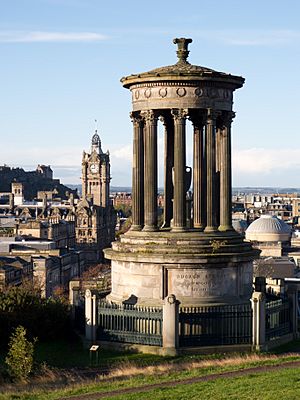Dugald Stewart Monument facts for kids
 |
|
| Coordinates | 55°57′19″N 3°10′56″W / 55.95528°N 3.18222°W |
|---|---|
| Location | Calton Hill, Edinburgh, Scotland |
| Designer | William Henry Playfair |
| Material | stone |
| Completion date | August 1831 |
| Dedicated to | Dugald Stewart |
The Dugald Stewart Monument is a special memorial in Edinburgh, Scotland. It honors a famous Scottish thinker named Dugald Stewart (1753–1828). You can find this monument on Calton Hill, which offers amazing views of the city. A talented Scottish architect, William Henry Playfair, designed it. The monument was finished in September 1831.
Contents
What Does the Monument Look Like?
The design of the Dugald Stewart Monument is quite unique. It was inspired by an ancient Greek building called the Choragic Monument of Lysicrates. This original building is in Athens, Greece.
The monument is shaped like a round temple. It has nine tall, fluted columns that stand around a decorative urn. These columns are in the Corinthian order, which means they have fancy tops. The whole structure sits on a raised circular base.
Why This Design?
The design of the Choragic Monument became well-known thanks to a book. This book, called The Antiquities of Athens, was published in 1762. It showed detailed pictures of ancient Greek buildings.
The Dugald Stewart Monument is considered a very important building. It has been a "category A listed building" since 1966. This means it's a historic site that needs to be protected. Another monument nearby, dedicated to the poet Robert Burns, also uses a similar round temple design.
Who Was Dugald Stewart?
Dugald Stewart was a very important professor at the University of Edinburgh. He taught moral philosophy from 1786 until he passed away in 1828. Moral philosophy is about studying what is right and wrong.
The Royal Society of Edinburgh, a group of smart people, decided to build this monument. They chose its spot on Calton Hill in 1830.
The Architect: William Henry Playfair
William Henry Playfair was a busy architect in Edinburgh. Besides the Dugald Stewart Monument, he designed other famous structures. He helped create the National Monument of Scotland, also on Calton Hill.
Playfair also planned the streets that go around Calton Hill. These include Royal Terrace, Carlton Terrace, and Regent Terrace. He truly shaped the look of this part of Edinburgh.


